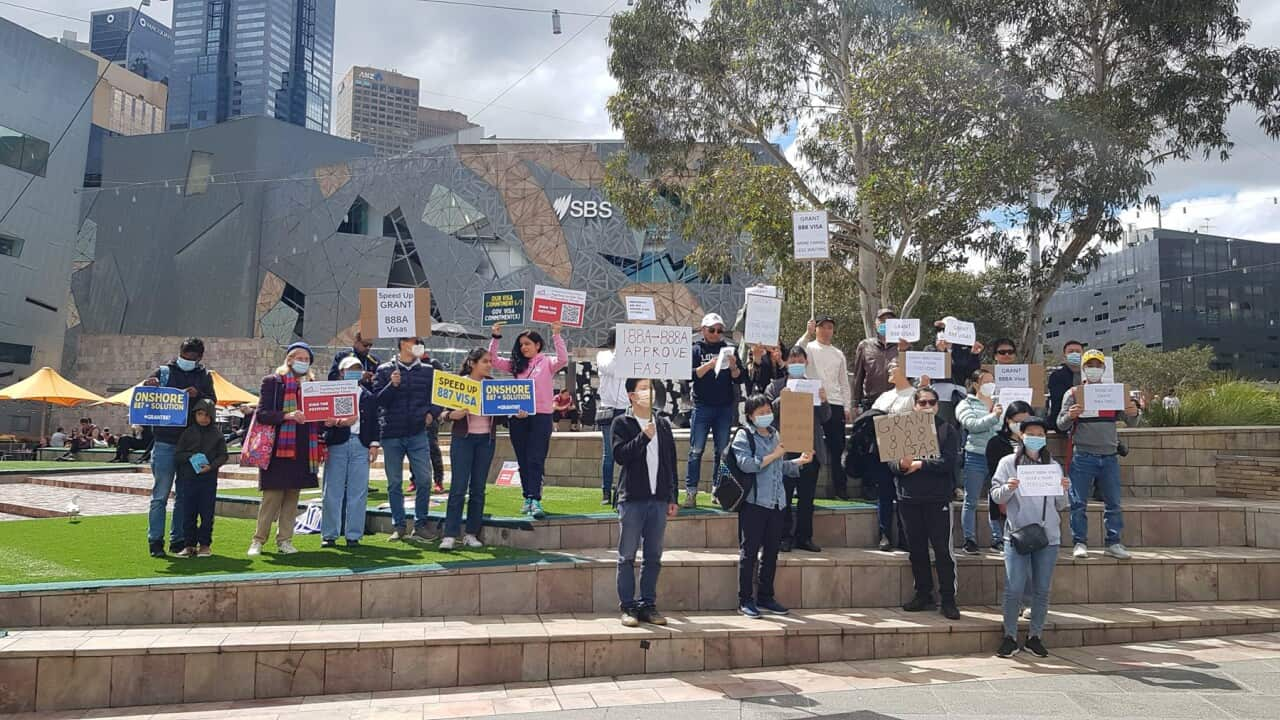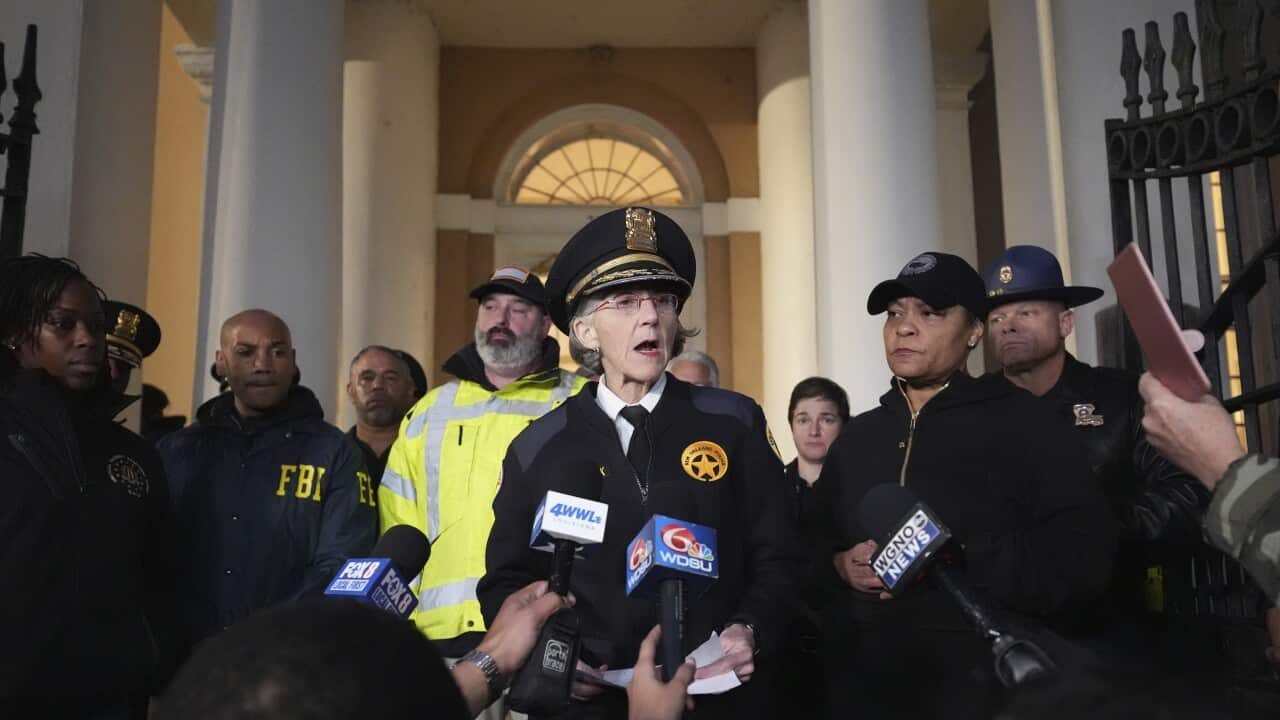Italian
Durante una manifestazione a Melbourne, l’ingegnere nato in India Brijesh Batra ha condiviso la sua storia di una vita trascorsa nel limbo a causa delle pastoie burocratiche.
"Very uncertain, unstable. we don't know when we will buy the house, when we will feel settled. I am 43. I don't know when things will take a good turn you know. each decision in life is based on once we get the PR (permanent residency). We will do this, we will do that. Until then we are not sure what the future will be, you know."
I migrant con visti temporanei sono scesi in strada per protestare contro i tempi per ottenere la residenza permanente.
(CHANTING) Hey hey ho ho. Visa backlog has got to go."
Il migrante nato in Cina Pard Tan ha dichiarato di aver depositato i suoi documenti per la residenza permanente oltre due anni fa.
"Nearly 25 months, that's really a long time yeah. No idea why it is such a long time. it doesn't make sense."
Un’analisi del Migrant Workers Centre dipinge un quadro cupo sulla missione che attende i nuovi migranti per fare diventare l’Australia veramente la loro casa.
Mette in luce la scoperta che il numero di chi ha un bridging visa è aumentato di sei volte, con i tempi di disbrigo delle pratiche per la sottoclasse 887 dei visti qualificati regionali raddoppiati a due anni.
Chi ha fatto domanda per il visto 186 sponsorizzato da un datore di lavoro aspetta per circa un anno, mentre il direttore del Centro Matt Kunkel riferisce che chi ha i visti indipendenti qualificati 189 deve aspettare un tempo di attesa di 39 mesi per diventare cittadino permanente.
"There are tens of thousands of people around the country still waiting for their visa. We saw people here today, 15 months, 20 months are still waiting and no ability to kind of move on with their lives. So we've got large numbers of people right around the country, just waiting by the phone for that call to let them live their lives. They are still considered as foreign residents despite being in this country for many years. Paying tax here for many years. They have none of the benefits that the rest of us enjoy as taxpayers in Australia."
E con ulteriori lavoratori necessari dall’estero per fare fronte alla carenza di manodopera, non c’è traccia di sollievo per la montagna di coda.
Gli organizzatori della manifestazione hanno chiesto al ministero dell’interno di dare la priorità ai visti di chi già vive in Australia – alcuni di loro fin da cinque anni.
Haniah Davis – un’operatrice comunitaria del Migrant Workers Centre – è lei stessa una di loro.
“We have to speed up these visa processing times and we need to start clearing the backlog. We made our commitments to the government right. We have done everything right. we have paid our fees to apply, we have gone through the whole process - police checks, and work requirements, regional living requirements and everything. We have done it all. It's time we get the one thing we have asked for which is our visa granted."
Il governo Albanese ha dichiarato di essere determinato a ridurre gli arretrati lasciati dalla Coalizione e ha definito l’impresa una priorità urgente.
Ma la pazienza di questi migranti si sta esaurendo.
(Chanting) Speed up! Speed up Speed up"
English
At a rally in Melbourne, Indian-born engineer Brijesh Batra shares his story of a life left in limbo by bureaucratic red tape.
"Very uncertain, unstable. we don't know when we will buy the house, when we will feel settled. I am 43. I don't know when things will take a good turn you know. each decision in life is based on once we get the PR (permanent residency). We will do this, we will do that. Until then we are not sure what the future will be, you know."
Migrants on temporary visas have taken to the streets to protest against how long it's taking to get permanent residency.
(CHANTING) Hey hey ho ho. Visa backlog has got to go."
Chinese-born migrant Pard Tan says he put his documentation in for permanent residency more than two years ago.
"Nearly 25 months, that's really a long time yeah. No idea why it is such a long time. it doesn't make sense."
An analysis by the Migrant Workers Centre paints a grim picture of the quest by new migrants to make Australia truly their own home.
Its report finds there has been a six-fold increase in the number of bridging visa holders, with the processing time for the 887 sub-class skilled regional visa doubling to two years.
Those applying for the 186 employer-sponsored visa are waiting around a year while the centre's chief executive Matt Kunkel says those on 189 skilled independent visas face a 39-month wait time to become a permanent resident.
"There are tens of thousands of people around the country still waiting for their visa. We saw people here today, 15 months, 20 months are still waiting and no ability to kind of move on with their lives. So we've got large numbers of people right around the country, just waiting by the phone for that call to let them live their lives. They are still considered as foreign residents despite being in this country for many years. Paying tax here for many years. They have none of the benefits that the rest of us enjoy as taxpayers in Australia."
And with more workers needed from overseas to tackle labour shortages, there's little relief in sight for the mounting visa queues.
Rally organisers have called on the Department of Home Affairs to prioritise the processing of visas for those already living here in Australia - some for up to five years.
Haniah Davis - a community worker for the Migrant Workers Centre - is herself one of those people.
“We have to speed up these visa processing times and we need to start clearing the backlog. We made our commitments to the government right. We have done everything right. we have paid our fees to apply, we have gone through the whole process - police checks, and work requirements, regional living requirements and everything. We have done it all. It's time we get the one thing we have asked for which is our visa granted."
The Albanese government says it's determined to reduce the backlog left by the coalition and has made tackling it an urgent priority.
But the patience of these migrants is wearing thin.
(Chanting) Speed up! Speed up Speed up"
Report by Gareth Boreham
Ascolta tutti i giorni, dalle 8am alle 10am. Seguici su , e o abbonati ai nostri podcast cliccando .




